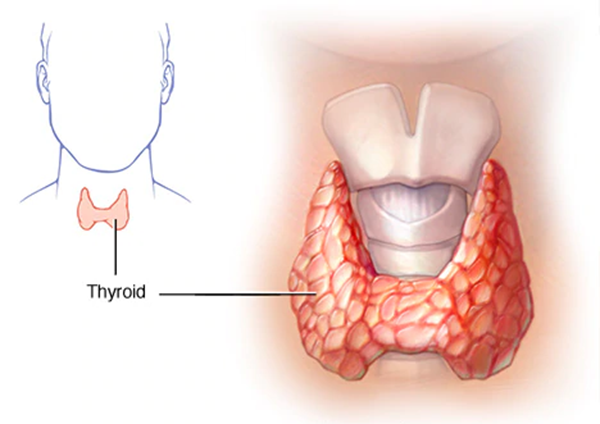How Hypothyroidism Can Be Cured Naturally?
As per Ayurveda Aspect
According to the Ayurvedic system of medicine, the functioning of the thyroid gland is controlled by the pitta dosha in the body where Pitta is referred to as Agni. According to the acharyas, in hypothyroidism pitta dosha is covered by the Kapha dosha which ultimately diminishes the metabolism of the cells.
Definition of the Thyroid Gland
The thyroid gland is a butterfly-shaped endocrine gland which is located in the lower front side of the neck. Thyroid forms the thyroid hormones which are secreted into the bloodstream and carried out to the body tissues. This hormone helps the body to use energy, stays warm and maintains the functioning of the brain, muscles, heart, and muscles.
What is Hypothyroidism?
Hypothyroidism is referred to as the underactive thyroid gland which means that the thyroid gland is unable to make enough thyroid hormone. Some common causes are autoimmune disorders such as Hashimoto’s thyroiditis, surgery of thyroid gland and radiation therapy.
What are the Causes of Hypothyroidism?
There are several causes why the cells in the thyroid gland can’t produce enough thyroid hormone. Some major causes from the most to the least common.
Autoimmune Disorders
The immune system is designed to protect the cells of the body against the invading bacteria and virus. When an unknown bacteria or virus enters the body then the body’s immune system responds to it by sending out the fighter cells or phagocytes by destroying the foreign cells.
Hashimoto is the most autoimmune disease that is caused due to an underactive response of thyroid gland. It attacks the thyroid gland that causes chronic inflammation of thyroid which alters the functioning of the thyroid.

Thyroiditis
Thyroiditis causes the stored thyroid hormone to leak out of the thyroid gland. This causes the rise in the hormonal level in the blood which leads to hypothyroidism in which thyroid levels are too high that lasts for 1 to 2 months. Some may develop hypothyroidism before the thyroid is completely healed.
Thyroid Surgery
Removing a large portion of thyroid gland can diminish the production of the hormone.
Radiation Therapy
Radiation therapy is used to treat cancers of the neck and head can affect the thyroid gland which may lead to hypothyroidism.
Medications
Overuse of medications can contribute to hypothyroidism such as lithium.
What are the Symptoms of Hypothyroidism?
Mostly hypothyroidism affects middle-aged and older people. Thyroid hormones affect the multiple organs so the symptoms are wide-ranging and diverse.
Thyroid generally produces two thyroid hormones-triiodothyronine (T3) and thyroxine (T4). These hormones regulate metabolism and affect the following functions:
- Breathing
- Brain development
- The functioning of the heart and nervous system
- Strengthening of muscles
- Dry skin
- Weight
- Cholesterol levels
Some symptoms include
- Gaining weight
- Cold intolerance
- Multiple joint pain
- Muscle pain and weakness
- Insomnia
- Depression
- Anemia
If the condition left untreated
- Puffiness in the face
- Hoarseness of voice
- Slower heart rate
- Loss of hearing
Herbs Useful to Manage the Symptoms of Hypothyroidism
Herbs aid in removing the Kapha dosha which is coated over the pitta dosha which improves the functioning of pitta dosha normally.
- Gotu Kola
Gotu Kola has been used in Ayurveda as an herbal tonic to treat mood disorders and enhances the memory. This herb also appears to reduce anxiety by regulating the activities of neurotransmitters. It improves the blood circulation and has potent antioxidant effects that neutralize the free radical which causes cell damage at the molecular level. It also treats symptoms associated with hypothyroidism such as muscle and joint pain, cold intolerance, etc.
- Guggul
Guggul contains an active ingredient called guggul sterone which is used to treat weight gain, metabolic and thyroid related issues. This herb lowers down the cholesterol level and boosts up the thyroid function. It appears to have an anti-oxidant property and also protects the brain health. According to Ayurveda, it pacifies the vitiated Vata dosha in the body.
- Shilajit
Regular consumption of shilajit metabolizes the vitamins and proteins, contains antioxidants that promote the regeneration of cells. Shilajit boosts up the thyroid functioning and manages the symptoms associated with hypothyroidism.
- Ashwagandha
Ashwagandha is known as the strength of the stallion as it has been used in Ayurveda to strengthen the body’s immune system after illness. This herb enhances the stamina and works as a natural stress reliever. It shows some incredible results in lowering down the cortisol levels and balancing the thyroid hormones. It is valued for its anti-inflammatory, antidepressant, thyroid modulating and anti-anxiety properties.
- Punarnava
Punarnava has been used as a health supplement since ancient times and is a very popular herb in Ayurveda. This herb is extremely good for the liver and prevents the occurrence of infections. Being a diuretic it can help to prevent kidney stones from occurring. It also treats hypothyroidism, fibroids, heavy menstruation, fibroids and urinary tract infections in women.
- Kanchnaar
Kanchnaar possesses the anti-microbial activity and is enriched with a huge number of anti-oxidants. Kanchnaar is empowered to pacify the Vata, Pitta and Kapha dosha in the body. It is quite effective in treating thyroid disorders, lymph nodes swelling, leprosy, fistula and glandular swelling. It also supports the functioning of the lymphatic system and eliminates the toxins from the body.
Some other Natural Treatment
- Daily intake of decoction prepared from the shigru herb that helps a lot.
- Amla Churna can also be taken with honey for the proper functioning of the thyroid.
- Vitamin A rich foods such as green leafy vegetables, carrots, and pumpkins can also be taken.
- Cucumber also shows good results in hypothyroidism.
- Walnuts contain magnesium and iodine which contributes to the balanced functioning of the thyroid gland.
- You can also take herbal tea with ginger daily.
Avoid
- Avoid potatoes, whole wheat products, and unpolished rice as these contain carbohydrates.
- Caffeine-containing beverages should also be avoided.
- Quit smoking as smoking depresses the thyroid hormone levels and causes hypothyroidism.




